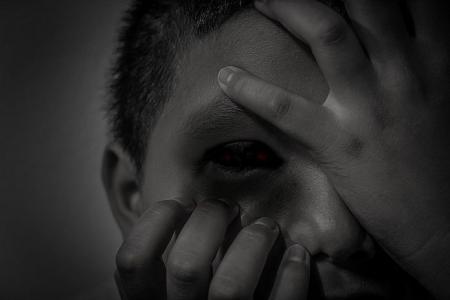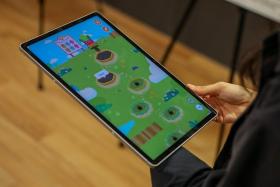Suspect child abuse? Intervene early
A horrific child abuse case has led to outrage and questions. Two-year-old Mohamad Daniel Mohamad Nasser died after getting beaten by his mother and her boyfriend. They were sentenced on Tuesday. What can be done before it is too late?
One mother intervened before her husband continued beating their daughter.
In doing so, she prevented the man from causing greater harm, or even death.She also approached the National University Hospital (NUH) to seek help for their three-year-old.
Jane (not her real name) explained that her husband could not tolerate the toddler's mess and noise, and went into his "disciplinary mode" and physically punished her.
That happened a year ago, relates NUH senior medical social worker Lim Jia Yi.
She says: "The wife was worried that her husband might go overboard and inflict more harm on their daughter.
"It was a vicious circle because every time the child cried, the father would 'discipline' her. And when he 'disciplined' her, she cried."
It went on for at least six months before Jane decided to seek help.
"After further investigation, we found that when the father was young, he was also physically punished when he misbehaved. So he thought that that was the only way to discipline a child," Ms Lim says.
As it was deemed a moderate to high risk case, the Ministry of Social and Family Development's (MSF) Child Protective Service (CPS) took over.
The toddler was placed in foster care after two months because her father resorted to beating her again.
Another case was reported by a doctor who found injuries on an infant that did not appear to be accidental.
Head consultant of the division of general ambulatory paediatrics and adolescent medicine at NUH, Dr Chan Poh Chong, has dealt with numerous child abuse cases over the span of 20 years.
Four years ago, he came across a couple who told him that their son was injured after falling off a bed.
But after examining the wounds and bruises on the four-month-old, he suspected they were not being truthful - the infant had multiple injuries on his arms and legs.
Dr Chan says: "The injuries were inconsistent with the parents' story.
"The parents came to us only after the child refused to eat and started crying excessively."
After further probing, the parents confessed they were under a lot of stress, and could have vented their anger on their youngest child, he says.
Dr Chan then alerted medical social workers. After further investigation, they referred the case to CPS.
It conducted its own investigation and subsequently placed the child in the care of other family members.
Says Dr Chan: "Once we notice that the injury is not accidental, we will inform the medical social workers immediately, and they will take over from there."
It is the standard procedure for all hospitals, he adds.
When a doctor alerts medical social workers, they will investigate further and decide what to do next.
Ms Lim says further assessments of the family usually reveal the struggles the parents face managing the child.
She says medical social workers will conduct social risk assessments and make home visits to determine whether it is safe for the child to return home.
Ms Lim says: "We'll have to establish a risk within a day and put in place a protective mechanism as soon as possible, especially for patients who are not admitted."
There are three categories for cases: Low, moderate and high risk.
Low risk cases usually involve the parents going through transition stress that might stem from job changes or financial problems.
Moderate risk cases usually involve a one-time or rare abuse that lead to serious injuries such as bleeding from the head or fractures.
High risk cases involve abuse that has been going on for a while, or where parents do not feel remorseful after punishing the child.
SOCIAL STRESSES
"We look at three things: the child's needs, as well as the parents' characteristics and social stresses such as marital conflict or financial hardship," says Ms Lim.
"Usually, for moderate to high risk cases where we feel that the abuse might happen again, we will have to alert CPS."
Once alerted, CPS will acknowledge the case within a working day and conduct another round of assessment to determine what kind of help the family needs, she says.
But not every child has to go through such a procedure to get help.
Child protection specialist centre Heart@Feiyue has had its hotline open to the public since April.
It previously took on only abuse cases referred by MSF.
Heart@Feiyue agency head Ng Kwai Sim says it receives on average of 25 calls a month.
She says: "There is no such thing as a false alarm. Every call is important.
"Even if you are not too sure, just call and consult us so that we can assess the case."
Ms Ng encourages neighbours and relatives to call their hotline without fear of being labelled a "busybody" as the caller's identity remains anonymous.
She says: "Every one plays a role. You can be a part of the community by calling us if you notice signs of child abuse.
"It takes the whole community to look out for the children in need."
Helplines
Heart@Fei Yue 6819-9170
Monday to Friday, 9.30am to 5.30pm
Big Love Child Protection Specialist Centre 6445-0400
Monday to Friday, 9am to 6pm
Child Protective Service Helpline (MSF)
1800-777-0000
Monday to Friday, 8.30am to 5.30pm
Saturday, 8.30am to 1pm
Tinkle Friend 1800-274-4788
Monday to Friday, 2.30pm to 5pm
- Online chat operating hours: Monday to Friday, 2.30pm to 5.30pm and Wednesday, 6.30pm to 8.30pm
Get The New Paper on your phone with the free TNP app. Download from the Apple App Store or Google Play Store now


